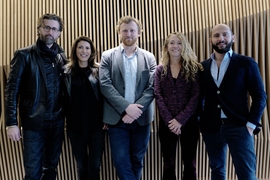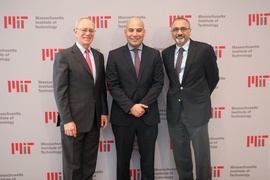Today, the Abdul Latif Jameel World Education Lab (J-WEL) kicks off its first J-WEL Week, a semiannual meeting of members to explore new developments in brain science, pedagogy, and digital learning practices. The theme of the meeting is “The Power of Problem Solving.” During the four-day meeting, participants will use presentations on MIT educational research and teaching approaches as a jumping off point for articulating goals and action plans for their own organizations.
Sanjay Sarma, MIT vice president for open learning, describes the J-WEL approach: “Through J-WEL, we will forge new and long-lasting collaborations as we learn, share, and train together, using the assets developed at MIT as well as by leveraging the community convened by J-WEL.”
J-WEL Week is structured in three parallel, interwoven programs, one for each of the lab's three collaboratives — pK-12, Higher Ed, and Workplace Learning. The program has been designed by J-WEL faculty directors professors Angela Becher, Eric Klopfer, Hazel Sive, and George Westerman, with the strategic leadership of J-WEL Executive Director Vijay M.S. Kumar, who each bring to the program decades of experience and passion across pre-K-12, higher education, and workplace learning.
Attendees at the first J-WEL Week come from 27 countries, including Australia, China, Colombia, Jordan, Nigeria, Saudi Arabia, and Spain. The participants include university senior administrators, industry leaders, educators, government officials, and heads of leading foundations.
The event is being held at the McGovern Institute for Brain Research, and features some of the top educational innovators from the MIT community. The week will begin with a welcome from Vice President of Open Learning Sanjay Sarma and J-WEL Executive Director Vijay Kumar, followed by presentations highlighting unique aspects of the MIT educational approach. The next two days will include deeper dives for each membership collaborative: pK-12, Higher Education, and Workplace Learning, with attendees participating in modular breakout sessions that address their specific interest areas. Speakers throughout the week include MIT professors Martin Culpepper, Robert Langer, Mitchel Resnick, Laura Schulz, Emma Teng, and Karen Willcox.
J-WEL will work with educators, universities, governments, and companies to revolutionize the effectiveness and reach of education, and aims to prepare people everywhere for a labor market radically altered by technological progress, globalization, and the pursuit of higher living standards around the world. A guiding focus of J-WEL is populations underserved by education both globally and domestically, such as women and girls, a growing displaced population that includes refugees, and those underrepresented in STEM fields.
J-WEL was launched in May by Community Jameel, the social enterprise organization, and MIT. The chairman of Community Jameel is MIT alumnus Mohammed Abdul Latif Jameel ’78, a life member of the MIT Corporation and 2016 recipient of the MIT Alumni Association’s highest honor for his history of service and philanthropy. J-WEL is named in honor of his father, the late Abdul Latif Jameel, founder of the Abdul Latif Jameel business, whose work to help the lives of tens of thousands of people is continued today by Community Jameel.
“Education and learning are fundamental to a strong society and economy,” says Fady Mohammed Jameel, president of Community Jameel International, “they promote employment and create increased opportunity for all.”








